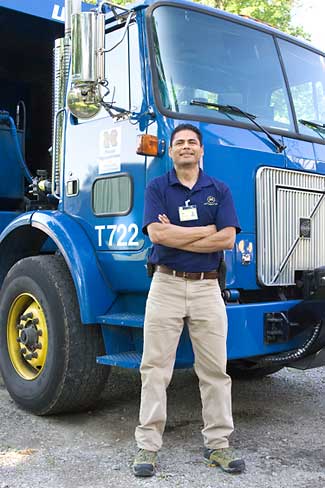After football games when forgotten purses, umbrellas and coolers share dumpster space with empty drink bottles; during spring move-out when discards fill dumpsters to overflowing; and six days a week around campus, no matter the season, Waste Management Operations Foreman Samuel Moran and his staff keep University grounds tidy.

“We pick up all the dumpster garbage in Michigan Stadium and the surrounding parking lots,” says Moran, who has worked 23 years at the University. “If it’s in the garbage we just dispose of it. We go around and empty the large dumpsters with the refuse trucks.”
Moran and a staff of five plus two temporary employees pick up all trash on campus, except for the U-M Health System, which contracts out for trash pickup.
Moran started his career as a custodian with Building Services, and then worked a year and a half as a cook at West Quad. Twenty years ago, Moran moved to the Grounds and Waste Management department of Plant Operations. “I’ve been in waste management (the past) two and a half years. I have great pride in the appearance and maintenance of the campus; I think the current job I have is a different aspect than grounds, but just as important.”
Moran says one of the most impressive things about the five drivers who work for him is the way they maneuver 32-foot trucks—which weigh in at 42,000 pounds empty—around campus.
All trash and recyclables are picked up and taken to the Materials Recovery Facility, which is owned by the City of Ann Arbor and operated by North Carolina-based FCR, at Ellsworth and Platt roads. “We take all garbage to that site: paper for recycling, mixed recyclables. We also pick up food compost from some of the dorms.”
“We do have a reuse program where students can donate clothing and loft wood during move out; outside each dorm there is a ‘take it or leave it’ area,” Moran says. “There’s a lot of good lumber left, carpeting, and some furniture. A lot of wood gets picked up and reused by the public, it works pretty good.”
When it comes to getting money back for recyclables taken for processing, Moran says, “We can make some on the cardboard and the white paper, it just defers some of the tipping (dumping) fees.”
A typical workday begins at 5 a.m. and ends at 1 p.m. “We’ve adjusted our lives to that schedule,” he says, explaining it is necessary to pick up garbage during non-peak travel times. “It can be a problem dealing with traffic and pedestrians; over the years the traffic starts earlier and earlier, people are just getting to work earlier. We’ve got to pick and choose where we want to go first; there are some busy areas,” Moran adds, particularly in the Huron Street vicinity.
Renovation or demolition projects also generate more trash. “For instance, there’s a higher volume of garbage coming out of the Frieze Building,” Moran says, as the building occupants have been relocating.
The day opens with Moran checking messages from University staff seeking special pickups. “We talk about it with the drivers and they add it on to their regularly scheduled route,” he says
Off the job, Moran is a dedicated athlete, running 4-5 days a week and 4-5 miles each session. He started five years ago, when a friend interested him in taking part in the 13.1 mile Dexter-Ann Arbor Run. “I’ve always liked running—you either love it or hate it,” Moran says. He’s lost 45 pounds since dedicating himself to the activity, and has been able to log a 7-minute 55-second mile. “When I’m running I like thinking and checking out my surroundings, my lungs open up; physically I feel good,” he says.
Moran says the activity is also great for relieving stress.
Beyond the scheduled pickups, Moran says, “Anything can happen; you can have truck breakdowns or special calls throughout the day. We just handle it.”
“‘We Make Blue Go’—I really like that slogan,” he says.

